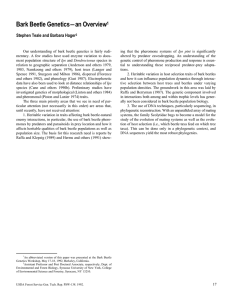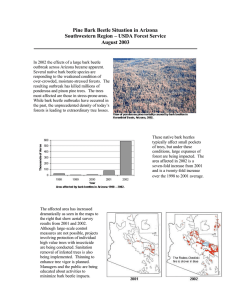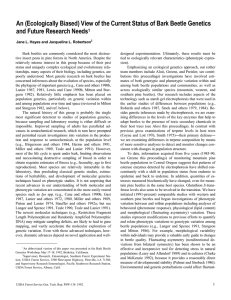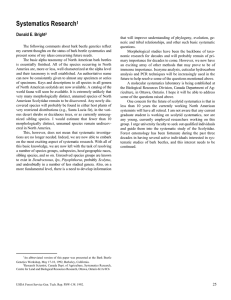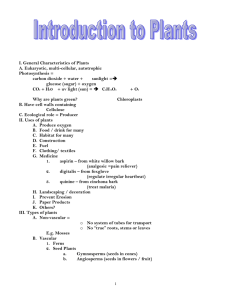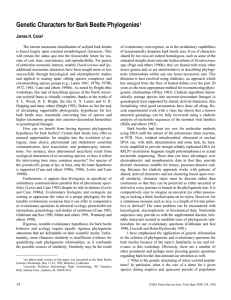Document 11416583
advertisement
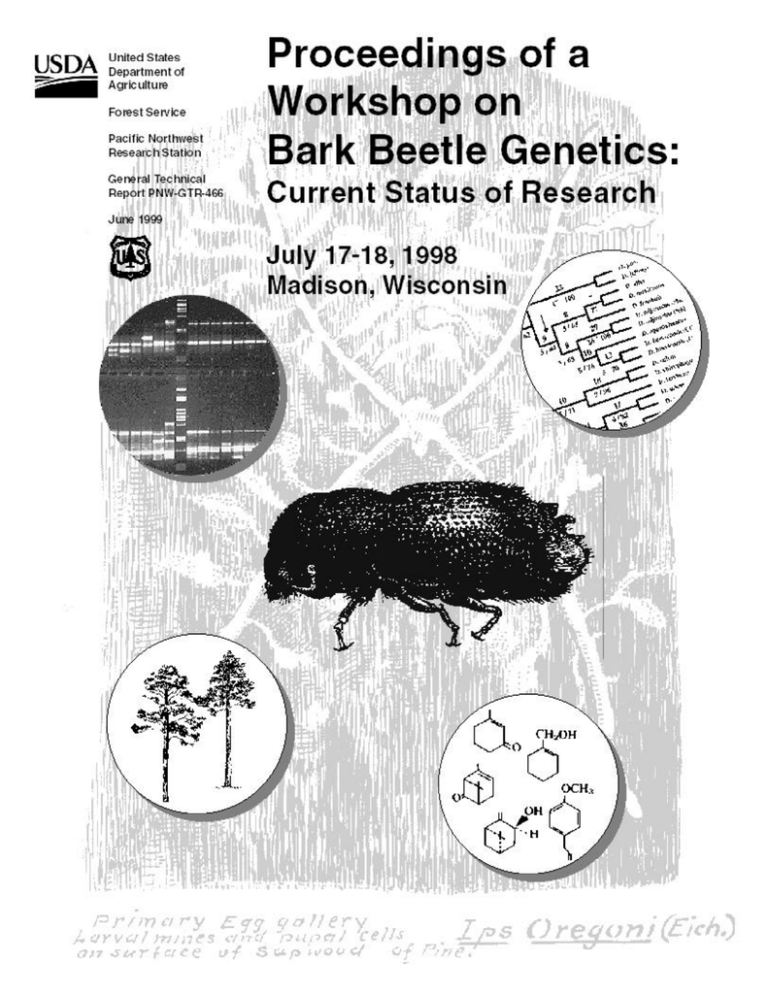
Abstract Hayes, Jane L.; Raffa, Kenneth F., tech. coords. 1999. Proceedings of a workshop on bark beetle genetics: current status of research. Workshop on Bark Beetle Genetics; 1998 July 17-18; Madison, WI. Gen. Tech. Rep. PNW-GTR-466. Portland, OR: U.S. Department of Agriculture, Forest Service, Pacific Northwest Research Station:. 63 p. This proceedings contains contributions from each author or group of authors who presented their current research at the bark beetle genetics workshop held 17-18 July 1998 on the campus of the University of Wisconsin in Madison, Wisconsin, USA. This was the second meeting on this subject; the first was held in 1992. The subject of bark beetle genetics is of growing, international interest; researchers from Austria, Hungary, and Mexico, as well as from across the United States have contributed to this proceedings. The topics covered included molecular approaches to genetic analysis of bark beetles, genetic structure of bark beetle populations, variability in ecologically important traits: effects on beetle fitness, and systematics of bark beetles. Keywords: Scolytidae, molecular genetics, genetic variation, behavior, pheromones, natural enemies, host selection, population dynamics, phylogeny, systematics. Technical Coordinators Jane L. Hayes is a biological scientist, USDA Forest Service, Pacific Northwest Research Station, Forest and Range Sciences Laboratory, 1401 Gekeler Lane, La Grande, OR 97850. jhayes/r6pnw_lagrande@fs.fed.us Kenneth F. Raffa is a professor, University of Wisconsin-Madison, Department of Entomology, 1630 Linden Drive, 345 Russell Labs, Madison, WI 53706. raffa@entomology.wisc.edu Acknowledgments We thank Lynn Starr, Blue Mountains Natural Resources Institute, PNW, for the careful preparation of this document. We thank the Sewall Wright Institute and Brian Yandell, University of Wisconsin, for publicizing the workshop on its webpage. Our thanks also to the students of Department of Entomology, University of Wisconsin from Ken Raffa’s lab (Nadir Erbilgin, Kirsten Haberkern, Brian Aukema, and Kimberly Wallin) who assisted in innumerable ways in the preparation and during the workshop, which was held at the Memorial Union on the campus of the University of Wisconsin at Madison. Cover design by Dan White. Background is an etching by Edmonston from the historical collection at the Forestry and Range Sciences Lab, La Grande, OR. (Note that Ips oregoni = pini.) Cladogram is from Kelley and Farrell 1998, used with permission from Evolution journal. Chemical structure is from Thatcher et al., 1980, The Southern Pine Beetle, Forest Service Science and Education Administration Technical Bulletin 1631. RAPD-PCR agrose gel is by Jane Hayes. Authors are responsible for content and accuracy of papers. Opinions expressed may not necessarily reflect the position of the U.S. Department of Agriculture. The use of trade, firm, or corporation names in this publication is for the information and convenience of the reader. Such use does not constitute an official endorsement or approval by the U.S. Department of Agriculture of any product or service to the exclusion of others that may be suitable. Proceedings of a Workshop on Bark Beetle Genetics: Current Status of Research July 17-18, 1998, Madison, Wisconsin Jane L. Hayes and Kenneth F. Raffa, Technical Coordinators Contents Preface ......................................................................................................... iii 1. Genetic Structure of Ips pini (Say) Populations .......................................1 Anthony I. Cognato, Steven J. Seybold, and Felix A.H. Sperling 2. Insecticide Resistance and Nucleotide Variability in the Coffee Berry Borer ....................................................................3 R.H. ffrench-Constant 3. Genetic Variation in Dendroctonus frontalis, Within and Between Populations ............................................................................6 Jane Leslie Hayes 4. Using RAPD-PCR to Study Intraspecific Variation Among Bark Beetles ........................................................................................9 M. Carol Carter 5. Genetic Variation of Ips typographus L. Populations From Within and Outside of the Native Range of Its Host Picea abies (L.) Karsten ..................................................................... 12 Ferenc Lakatos 6. Ecological Genetics of European Ips Species ........................................ 15 Christian Stauffer 7. Karyology, Geographic Distribution and Origin of the Genus Dendroctonus Erichson (Coleoptera: Scolytidae) .............................. 20 Gerardo Zúñiga, Ramón Cisneros, and J. Macías-Sámano 8. Behavioral and Genetic Basis of Pheromone Evolution in Ips pini ................................................................................................ 22 S.A. Teale 9. Allozyme Diversity, Gene Flow, and Evidence for Non-Random Mating in the Jeffrey Pine Beetle, Dendroctonus jeffreyi ....................... 24 Diana L. Six, T.D. Paine, and J. Daniel Hare 10. Semiochemical Disparities Among Bark Beetles and Natural Enemies Responding to Bark Beetle Pheromones .................................. 26 Kenneth F. Raffa and Kenneth Hobson 11. Variation in Two Life History Traits of Dendroctonus ponderosae From Lodgepole and Ponderosa Pines in Idaho and Utah........................ 28 Barbara J. Bentz 12. Selection on Pheromone Production and Preference in Ips Pini ................ 30 Alice M. Shumate and Matthew P. Ayres 13. Application of Chemical Ecology to Conservation and Augmentation of Bark Beetle Predators, 1997 Results for Northern California and Wisconsin .......................................................................................... 33 D.L. Dahlsten, K.F. Raffa, D.L. Six, B.H. Aukema, and D.L. Rowney 14. Environmental and Genetic Influences on Host Selection Behavior of Bark Beetles: Roles of Population Phase and Geographic Origin ...... 35 Kimberly F. Wallin and Kenneth F. Raffa 15. Bark Beetle Genetics Research in the Bark Beetle/Pitch Canker/Pine System ................................................... 37 Andrew J. Storer, Pierluigi Bonello, David L. Wood, and Thomas R. Gordon 16. Genetic Perspectives on the Ecology and Management of Tomicus piniperda in North America ....................................................... 41 Therese M. Poland and Robert A. Haack 17. Tomicus and Anoplophora Genetics: Important Research Needs ............ 44 Robert A. Haack, Therese M. Poland, Jian Wu, and Hui Ye 18. Phylogenetic Analysis of Resource Use and Specialization in Dendroctonus (Coleoptera: Scolytidae) ................................................... 47 Scott T. Kelley and Brian D. Farrell References ....................................................................................................... 50 Preface In 1992 a group of researchers with an expressed interest in various aspects of bark beetle genetics gathered in Berkeley, CA, for a 2-day information exchange session. The goals of the original workshop were to promote interaction among researchers, foster collaboration, summarize the state of knowledge, and identify research needs for the future. The accomplishment of these goals is partially evident in the publication of the Proceedings of the Workshop (Hayes and Robertson, 1992, PSW-GTR-138), which contains both a list of priority research areas and an extensive list of pertinent references, as well as brief summaries from all the participants on their ongoing research efforts in bark beetle genetics. Another measure of success is the number of collaborations that have continued or originated from the workshop. It is obvious that internationally there is an ever-growing interest in this area of research. In the 6 years since the original workshop, the technical advances in molecular genetics have been astounding. Realization of the vision of Hobson and Edwards in their 1992 (p. 23-24) contribution regarding “Novel Bark Beetle Research Possible with New Genetic Techniques” is reflected in these 1998 contributions. Indeed, a glance at the reference section of the 1998 proceedings reveals that it is no longer “novel” to see members of the Scolytidae subject to molecular genetic investigation. In fact, a new generation of researchers, who are already accomplished in the employment of these new tools in their research efforts, joined the familiar faces at the 1998 workshop. One of the primary purposes of these workshops was to provide an opportunity to share information, results, and ideas. This gathering was organized to be sufficiently informal to maximize interaction among participants. the topics covered by participants included molecular approaches to genetic analysis of bark beetles, genetic structure of bark beetle populations, variability in ecologically important traits and their effects on beetle fitness, and systematics of bark beetles. Thus, for the participants in this second workshop, there were numerous topics to revisit, new advances to report, and certainly new collaborations and research avenues to explore. One thing was eminently clear to all participants at the end of the workshop: we all agreed that we shouldn’t wait so long for the next workshop.
